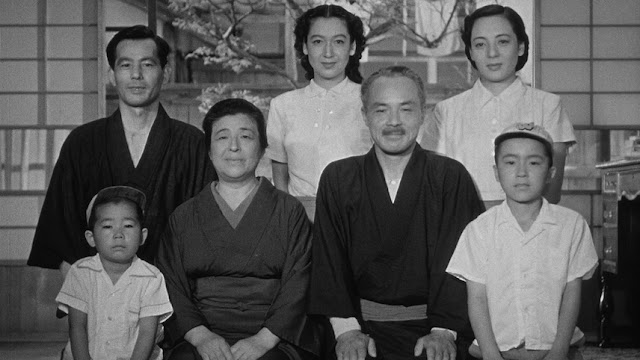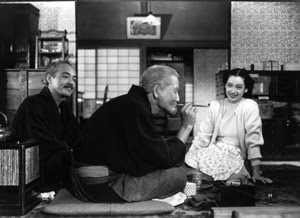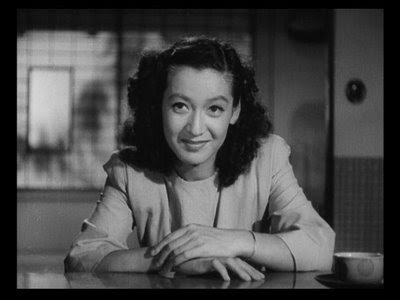A relative of mine, who would never claim to be a literary scholar, on the subject of Jane Austen, once offered me this: ‘for someone who never married and had no kids, that woman sure understood how families work.’
She meant power games, and the pressures family members place upon one another, and the conflicts between different generations, and even between different families. And she was right: Austen had rare insight into those things. But it was also interesting, to me, that she saw the single, childless Austen as an outsider looking in; as though, without those additional life experiences, one could not normally be expected to understand how families really worked.
Austen was close to her family for the entirety of her short life. Yasujiro Ozu was close to his, too. He died at 60, in 1963, having predeceased his mother, with whom he lived, by only a couple of years. He, too, left behind no spouse, and no offspring. But the director did leave behind a body of work profound in its examination of the family dynamic—the comforts, cruelties, and most importantly, inevitabilities of a life lived with others.
Among Ozu’s acknowledged masterpieces (a canon that also includes Late Spring (1949); Tokyo Story (1953); and Floating Weeds (1959)) it is Early Summer that focuses most fixedly on family structures. The household in Early Summer is a relatively happy, stable, and normal one, composed of two elderly parents, their unmarried daughter, their married son and his wife, and two young grandsons. And several pet birds. The family members get along, mostly; everyone is healthy, and money is good.
Yes, there are tensions here, we will learn, rather far along into the picture. But they are borne less of a conflict between individuals than of the fight those individuals put up against a progression of events. The first hour of Early Summer is quite peaceful, actually. The family’s balanced existence is disrupted only by the arrival of an uncle: brother of the grandfather, but seemingly much older, who stays with them in Tokyo for a few weeks before returning to his rural home. This uncle, unflappable and half-deaf, speaks his mind. And soon he’s commenting on what a concern it is that his niece, the near-30-year-old Noriko (Setsuko Hara), has yet to find a husband.
Suddenly, it is as though everyone remembers. Modern viewers will be shocked by the ease with which Noriko’s family and friends—even her boss—insert themselves into her personal affairs: each wondering, politely but openly, what has kept her single this long, and suggesting eligible options to fix the problem. Noriko, I think, would be perfectly content remaining single. She has married friends she does not envy; she makes good money and contributes to her household; she’s easy-going; she loves children and dotes on her two nephews. (They are brats, as children typically are in Ozu films, but she’s at ease with them.) Unlike her analogues in Late Spring and Tokyo Story, this Noriko is unmarried for no other reason than her wish to be, and at no cost to her happiness or material success.
That Noriko must butt up against the pressure to be what she does not wish to be is tragic. But her particular tragedy is not the point of the film—it is a means to the point. Times change, time marches on… and the elegant little lives we create for ourselves must one day fall away. We know this; and yet, we resist it; and when we resist it, we are unhappy. We observe this through Noriko, who always smiles, always puts in a solid day’s work, always responds to intrusiveness with grateful, if forced replies. And through secondary characters, like Noriko’s parents (Ichirô Sugai and Chieko Higashiyama), who share the memory of a terrible loss earlier in their lives, but who have coped with it differently. The mother still grieves, but the father dismisses this, claiming it’s pointless; comforting himself, but certainly not his poor wife, with the idea that asking too much from life is entitlement. This is a bromide, and a terribly cruel one, though he is not a cruel man. Time is pulling these two along, as it does everyone else, but she dislikes being pulled, because it means she must start to forget.
Will Noriko succumb to the pressure? Should she do so, she will leave her family’s home, removing its second income. Her parents will move to the countryside, to be with the old uncle. And the life led by her brother (played with particular brusqueness by Ozu vet, Chishu Ryu), will change significantly too. As it stands now, he occupies a position of middle management in his own house—a role he seems suited for, as he’s rather cold. He works long hours as a doctor, and often retreats from his domestic life to play checkers with an old buddy. With his parents and sister gone, he will be the sole breadwinner, senior authority, and one of only two caregivers in a house with two small children. Materially they will be fine, but emotionally, they may not be. That the brother still pushes so hard for Noriko to wed and leave the house speaks volumes about his belief in the primacy of social convention over individual choice. Not just her choice, but his.
Like all of Ozu’s mature works, Early Summer includes dialogue-free interludes—‘pillow scenes’, some call them—that reflect the themes of the film in poetic fashion. We see birdcages, for example. More memorably, we see the old father watching a train go by. It’s a modern train; fast. He stands behind a barrier as it blasts past him, taking its passengers to some place they believe is important. Perhaps to a place they feel they have no choice but to visit.
I have a lot of faith in my readership, so I’m not going to describe in detail some of the other Ozu trademarks found throughout Early Summer: the camera set at a low angle, the long takes, the rooms left empty—and still onscreen—once the people have left them. For many of us, especially in the West, these touches are transportive: they take us to a universe uniquely Ozu’s. But in their reflective, almost leisurely way, they remind us of our own lives, too. They help us find the tragedy in our everyday, and the beauty in that tragedy, and the truth in that beauty. When we see that truth, we cannot be outsiders anymore.
Where to find Early Summer:
Early Summer (Bakushū) will screen at Toronto’s TIFF Bell Lightbox on Friday, March 8, 2013; part of the retrospective Japanese Divas: The Great Actresses of Japanese Cinema's Golden Age.
The film is also part of the Criterion Collection.






i loved your write up. Thanks so much. Great memories of a wonderful Ozu film!
ReplyDeleteThanks Stan. I hope you've had a chance to see DRAGNET GIRL too. ;)
ReplyDelete